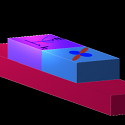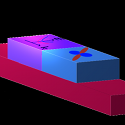Majorana fermions from topological insulator and superconductor junctions
Much attention has recently been afforded to topological insulators, which constitute a unique state of matter. One fascinating aspect is that they show insulating behavior in the bulk, but also spin-dependent conduction channels on the surface, suggesting, among other things, a potential for spintronics applications. Moreover, topological insulators in the proximity of a superconductor could show excitations that satisfy non-Abelian (noncommutative) statistics, the so-called Majorana fermions, which may be used for quantum computation. Why? Unlike a quantum state that decoheres with the smallest perturbation to introduce errors in computation, the topological properties of non-Abelian particles are protected by symmetry, making them robust.
In a recent article published in Physical Review Letters, Jacob Linder and collaborators in Norway and Japan have theoretically studied the proximity effects of a ferromagnetic-insulator–unconventional-superconductor junction deposited on a topological insulator. When the superconductor has spin-triplet pairing, charge excitations become gapless and the standard Andreev reflection that occurs at the interface between a superconductor and a nonsuperconducting region is suppressed. However, for a spin-singlet pairing superconductor with symmetry, zero-energy surface states, differently from the case of regular high- cuprates, are now Majorana fermions, and the tunneling conductance for a junction is now strongly dependent on the magnetization direction, due to the proximity of the topological insulator. Linder et al. also propose concrete experiments in the paper that could test these predictions. – Sarma Kancharla





